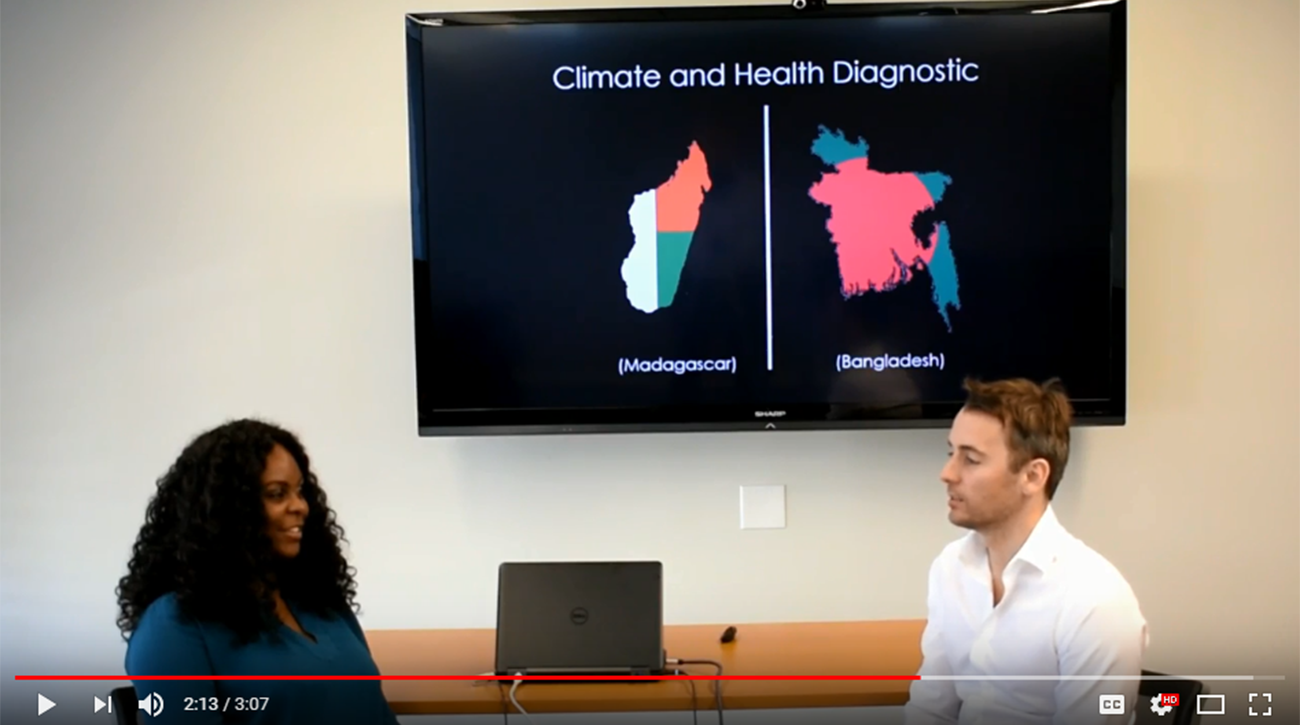“Climate change threatens health, and poor health threatens development,” said Timothy Bouley, MD, the World Bank’s Climate Change and Health Program Lead. Speaking at a recent seminar held by the Department of Environmental and Occupational Health (EOH) at GW’s Milken Institute School of Public Health, he explained how and why responding to climate change is now a World Bank priority, ushering in the era of climate-smart healthcare
The EOH department brings in one or two experts each month to discuss their research, and these popular seminars are one of the ways our students learn about current EOH topics.
Two-thirds of the world’s nations report concerns about the impacts that climate change will have on their citizen’s health, Dr. Bouley told his packed audience. Changes in the climate are expected to raise the burden of disease related to diarrhea by 10 percent by 2030 in some regions. As temperatures increase, rates of vector borne diseases including malaria, chikungunya, and dengue have already begun to shift and are expected to shift more. The Bank is also concerned about the impacts on malnutrition, he said.
The World Bank program on climate change and health that Dr. Bouley founded inspired the Bank to dramatically increase its implementation of strategies aimed at ameliorating health risks over the past three years. Projects are now screened and developed specifically to address both climate change mitigation and adaptation. As part of this work, he said, the World Bank has developed sector-specific strategies toward targeted investment.
From 0.1 to 30 Percent in Three Years
In 2015, 0.1 percent of the World Bank’s health investments were for work related to climate change. Three years later, 30 percent of the Bank’s health portfolio now targets health risks of climate change, a goal initially set for 2020. This includes efforts that involve evaluating the climate change and health impacts of development projects such as constructing energy infrastructure.
The World Bank essentially does three things, Dr. Bouley explained. In addition to lending money, the Bank produces reports and brings people together. He said that research collaborations with academic researchers like EOH Associate Professor Susan Anenberg help improve the Bank’s projects. Last year, one of those collaborations led to a publication about the impacts of cookstoves in Mozambique led by Anenberg and co-authored by an EOH student. “Publications like this validate the Bank’s development work,” Dr. Bouley said.
Dr. Bouley described examples of projects aimed at addressing the health impacts of climate change all around the world. “Developed countries will say, look this is an issue that we want to work on. Developing countries will ask the World Bank or other financing institutions for the resources—financial or technical—and it’s our job to respond and say ‘yes, we can address these issues,’” he explained. “You need a lot of folks working on these issues because they are so intractable,” he added.
The Bank has identified geographic hotspots where climate change is likely to be a problem, and researchers have begun and will continue to conduct climate and health diagnostics to identify opportunities for investments that can be used to reduce climate change health risks. (The slide shown in the photo above shows profiles for Bangladesh and Madagascar, which have differing health risks from climate change.)
After the seminar, Omobolanle “Bola” Oshinusi, a student in the EOH Environmental Health Science and Policy MPH program, asked Dr. Bouley a series of questions. During her time at Milken, Oshinusi pursued her strong interests in climate change and how adaptation and resiliency actions and policies can aid in mitigating health impacts associated with climate change through research projects. For example, in her Researching Climate Change and Public Health (PUBH 6135) class, she used frameworks developed by the World Bank to investigate how climate resiliency actions against sea level rise can help to combat dengue fever prevalence.
Oshinusi’s questions for Dr. Bouley elicted details about the identity of the major stakeholders who participate in the kinds of projects he discussed and how the issues that the World Bank projects address vary. View the interview, which includes Dr. Bouley’s observations on finding professional employment in efforts to address climate change, here
View Dr. Bouley’s seminar here
View Dr. Bouley’s responses to other questions here


